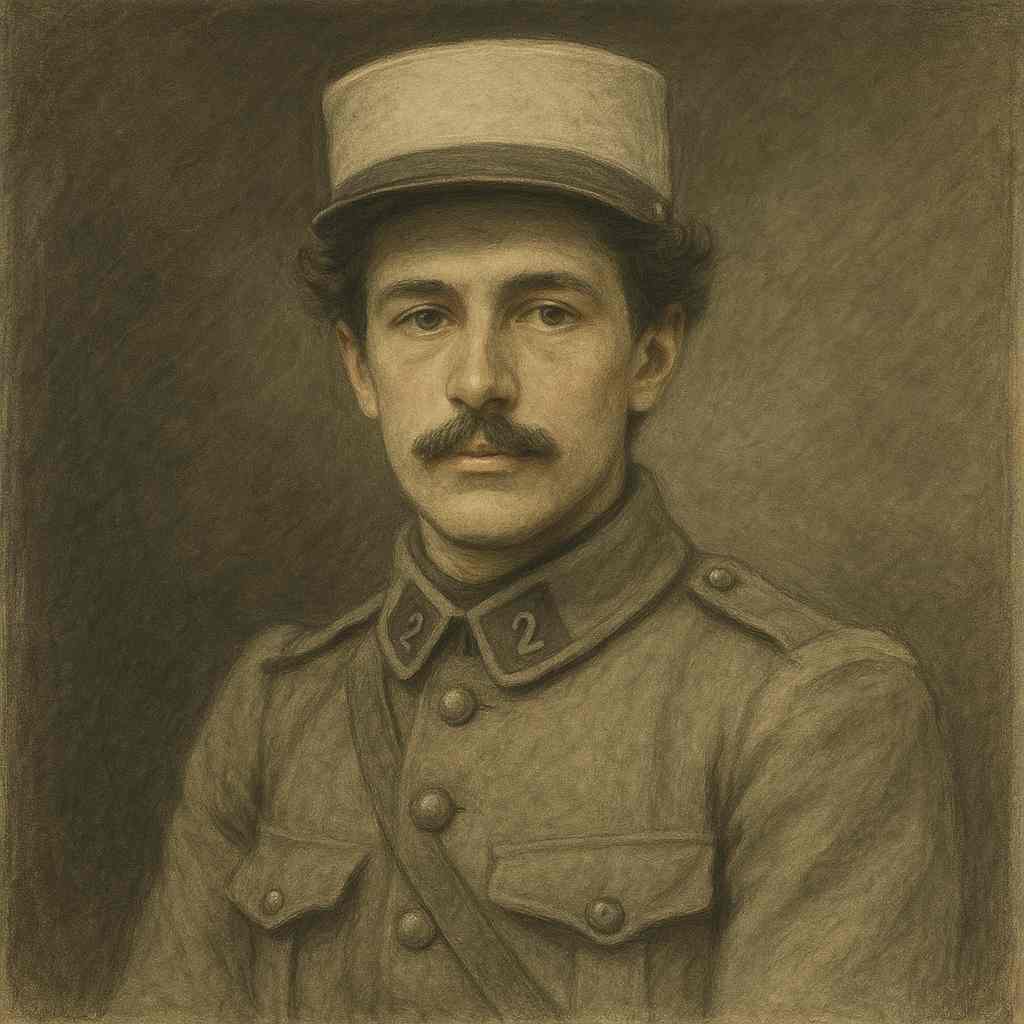There have been times
Alan Seeger
1888 to 1916

There have been times when I could storm and plead,
But you shall never hear me supplicate.
These long months that have magnified my need
Have made my asking less importunate,
For now small favors seem to me so great
That not the courteous lovers of old time
Were more content to rule themselves and wait,
Easing desire with discourse and sweet rhyme.
Nay, be capricious, willful; have no fear
To wound me with unkindness done or said,
Lest mutual devotion make too dear
My life that hangs by a so slender thread,
And happy love unnerve me before May
For that stern part that I have yet to play.
Alan Seeger's There have been times
Alan Seeger’s "There have been times" is a poignant meditation on love, longing, and resignation, encapsulating the emotional turbulence of a speaker who has endured prolonged separation and emotional strain. Written in the early 20th century, the poem reflects both the personal and historical context of Seeger’s life—a young American poet who would later die in combat during World War I. The work is marked by its restraint, its classical allusions, and its understated yet profound emotional depth. Through careful examination of its themes, structure, and historical resonance, this analysis will explore how Seeger crafts a meditation on love that is at once deeply personal and universally resonant.
Historical and Biographical Context
To fully appreciate "There have been times," one must consider Seeger’s life and the broader cultural moment in which he wrote. Born in 1888, Seeger was part of a generation that romanticized heroism and sacrifice, ideals that would soon be tested by the cataclysm of World War I. Though the poem does not explicitly reference war, its themes of endurance, emotional restraint, and impending fate resonate with the sensibility of a man who would later write "I Have a Rendezvous with Death." The poem’s tone—stoic yet tender—suggests a speaker who has learned to temper desire with discipline, a quality that aligns with Seeger’s own embrace of duty and fatalism.
Seeger was also deeply influenced by the Romantic and Decadent traditions, drawing from poets like Keats, Baudelaire, and the Italian sonneteers. This influence is evident in the poem’s classical references ("the courteous lovers of old time") and its measured, almost courtly approach to love. The speaker’s self-abnegation—his refusal to "storm and plead"—reflects a chivalric ideal, where love is not seized but endured with quiet dignity.
Themes: Love, Longing, and Resignation
At its core, "There have been times" is a poem about the evolution of desire. The speaker begins by acknowledging a past self who might have been more emotionally demonstrative ("There have been times when I could storm and plead") but has since adopted a stance of quiet acceptance. This shift is not born of indifference but of a deepened understanding of love’s fragility. The "long months that have magnified my need" suggest a period of separation or unrequited affection, during which the speaker’s yearning has grown even as his demands have diminished.
The poem’s central paradox lies in the idea that deprivation has refined rather than diminished the speaker’s love. He claims that "small favors seem to me so great," indicating a humility born of prolonged longing. This sentiment echoes the courtly love tradition, where the lover’s suffering is itself a form of devotion. The reference to "the courteous lovers of old time" reinforces this connection, positioning the speaker within a lineage of poetic figures who idealized restraint.
Yet there is also a darker undercurrent to this resignation. The speaker invites his beloved to be "capricious, willful," even to "wound [him] with unkindness," as if to steel himself against the vulnerability of mutual affection. The line "Lest mutual devotion make too dear / My life that hangs by a so slender thread" suggests that love, in its fullest form, might make the speaker unwilling to face an impending trial—perhaps death, duty, or some other inevitable sacrifice. This foreshadows Seeger’s own fate, lending the poem an eerie prescience.
Literary Devices and Structure
Seeger’s poem is a sonnet, a form traditionally associated with love poetry, but his use of the structure is subtly subversive. Unlike the Petrarchan or Shakespearean sonnet, which often builds toward a resolution or volta, Seeger’s poem sustains a tone of quiet resignation throughout. The absence of a dramatic turn reinforces the speaker’s emotional stasis—he is not seeking transformation but endurance.
The language is restrained yet richly evocative. Phrases like "magnified my need" and "asking less importunate" convey a sense of emotional refinement, where desire has been distilled to its essence. The alliteration in "discourse and sweet rhyme" lends a musicality to the poem, reinforcing its connection to the literary traditions it invokes.
One of the most striking images is that of life hanging "by a so slender thread," a metaphor that recalls the classical Fates, who spin, measure, and cut the threads of human lives. This allusion underscores the poem’s preoccupation with mortality and the precariousness of human attachment. The final lines—"And happy love unnerve me before May / For that stern part that I have yet to play"—suggest an impending trial, possibly military duty, that requires emotional fortitude. The reference to "May" could be literal (perhaps indicating an upcoming battle) or symbolic, evoking the traditional associations of May with renewal—a renewal the speaker may not live to see.
Comparative Readings and Philosophical Underpinnings
Seeger’s poem can be fruitfully compared to other works of early 20th-century literature that grapple with love and fate. Rupert Brooke’s war sonnets, for instance, similarly juxtapose romantic idealism with the specter of death. However, while Brooke’s "The Soldier" embraces patriotic sacrifice with almost ecstatic fervor, Seeger’s tone is more subdued, his resignation tinged with melancholy rather than triumph.
Philosophically, the poem aligns with Stoic thought, particularly in its emphasis on self-control and acceptance of destiny. The speaker’s refusal to "supplicate" mirrors the Stoic ideal of maintaining equanimity in the face of suffering. Yet there is also a touch of existentialism in the poem’s acknowledgment of life’s fragility—the sense that love, however profound, cannot ultimately shield one from fate.
Emotional Impact and Universality
What makes "There have been times" so enduringly moving is its emotional honesty. The speaker does not rage against his circumstances nor indulge in self-pity; instead, he acknowledges his vulnerability while asserting his dignity. This balance between passion and restraint gives the poem a quiet power, allowing readers to project their own experiences of love and loss onto its framework.
The poem’s universality lies in its depiction of love as both a sustaining and destabilizing force. Anyone who has loved deeply—especially in circumstances of separation or impending loss—will recognize the speaker’s conflicted emotions: the desire for closeness warring with the fear of becoming too attached. In this sense, Seeger’s poem transcends its historical moment, speaking to the timeless human condition.
Conclusion
Alan Seeger’s "There have been times" is a masterful exploration of love’s complexities, blending classical allusion, personal emotion, and historical resonance into a tightly crafted sonnet. Through its restrained language and subdued tone, the poem captures the paradox of desire—how absence can deepen affection even as it necessitates emotional fortitude. Situating the work within Seeger’s biography and the broader cultural milieu of early 20th-century poetry enriches our understanding, revealing a poet deeply attuned to the interplay of love and fate.
Ultimately, the poem’s power lies in its ability to convey profound emotion with understatement, allowing the reader to feel the weight of what remains unsaid. In an age that often privileges emotional excess, Seeger’s quiet dignity is a reminder of poetry’s capacity to move us not through grand declarations, but through the careful, measured articulation of the heart’s deepest longings.
This text was generated by AI and is for reference only. Learn more
Want to join the discussion? Reopen or create a unique username to comment. No personal details required!



Comments
No comments yet. Be the first to comment!